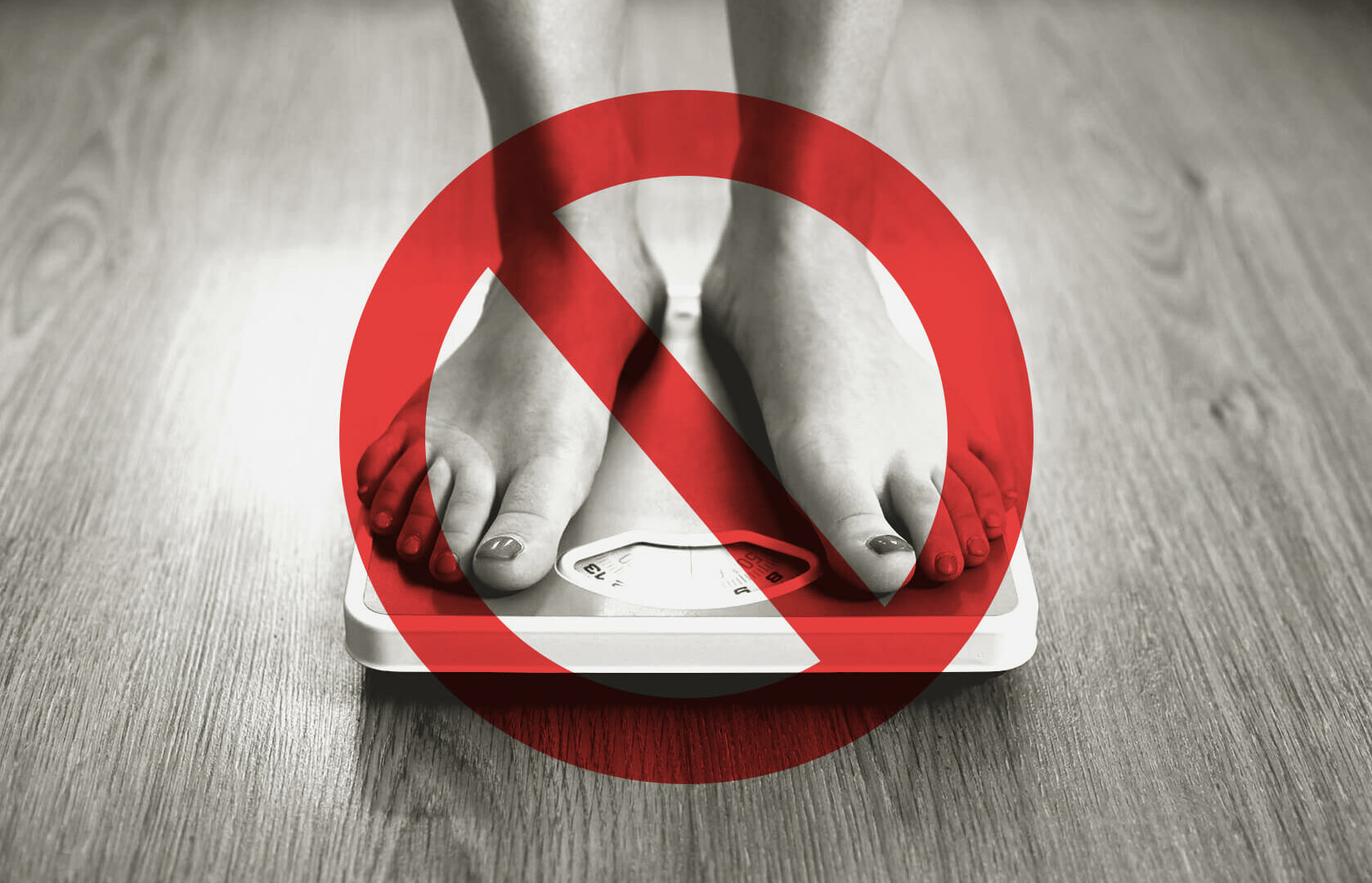What is going on Biolayne Readers!
Ever notice how you have a love/hate relationship with the scale? Some mornings you just want to take that scale and curse at it and toss it out your window…come on be honest with us. Lol
The scale can be very evil at times and really get to you mentally and lead to some very unhealthy habits and mood swings. We’ve worked with over a thousand clients and have seen these scale battles many times and what we really try and emphasize is that the scale is just one form of measurement. It’s just a damn number and we always emphasize to not ever let a number determine your mood for the day and self-worth.
If you are a practitioner, do not ever shame or guilt your clients when it comes to the scale, understand that it is just a tool and one form of measurement.If you stop and think about it, there are so many different variables that could make the scale go up or down. From a physiological standpoint alone it is insane and we will get more into the exact variables later in the article.
Once you understand that our bodies are consisted of roughly 60-65% of intracellular water fluid and 30-35% Extracellular water fluid then you start to understand how much water plays a role in the human body, scale, and you can’t let it be the end all, be all when it comes to measuring progress. [1]
Today we want to give you “3 of our Go-To Reasons to Avoid the Scale During your Fitness Journey” just in case you are getting to that point of wanting to self-destruct and are constantly letting the scale dictate your mood for the day, and most importantly are letting the scale win in your overall journey.
Reason #1- Consistency is Key
When we talk about consistency, we are putting this in the context of making sure you are weighing in daily, first thing in the morning fasted after using the bathroom, and on the same scale for accurate consistency. Always remember, to get the most accurate weigh-in, you must be consistent in everything we just mentioned. Otherwise your weigh-ins are always going to be all over the place, piss you off, most likely ruin your day, and potentially make you dread weigh-ins and quit your fitness journey.
Take Home:
- Use a digital scale and make sure it works
- Weigh-in first thing fasted, no clothes, after you use the bathroom, and use the same exact scale
- If you cannot commit to these steps, do not weigh-in each day, use a different form of measurement such as: Anthropometric measurements (hip/waist measurements), pictures, how clothes fit, and visual changes
Reason #2- Always Go with a Full 5-7 Day Weigh in Average
As we mentioned in the opening article, there are so many different variables that can play into weight regulation and have the scale going up and down. Our bodies are full of water and there are many physiological variables and environmental variables that could really cause some concern with the scale.
Some of the main variables are listed below:
- Elevated stress (rise in cortisol causes more water retention) [2]
- Lack of sleep (our bodies deplete moisture as we sleep thus we wake up lighter, vice versa, if sleep is bad you retain more water and wake-up heavier) [2]
- More sodium (sodium increases blood pressure and helps balance out fluids in our body. Too much sodium can cause more water retention thus to lead to the scale going up) [3]
- Excessive Fiber Intake (Fiber is thermogenic and can be very tough for our GI Tract and Gut to breakdown certain nutrients. Too much fibrous carbs can lead to more water retention and thus lead to the scale going up the next morning) [4]
- Eating late at night and a heavy meal could sit longer in the gut and thus bring scale weight up in the morning [5]
- Alcoholic Beverages (alcohol is a natural diuretic to the body, when we consume alcohol it will dehydrate you and make the scale go up or down) [6]
- Constant Anxiety
- Consuming too many fluids before bed
- Eating out too much at restaurants (many foods made by restaurants use hidden oils and more sodium which can lead to the scale going up.)
- Menstrual cycles (females) [7]
- Climate changes
- Excessive sweating from exercising in hot climates [8]
Take Home:
- Try and control what you can and do not stress what you cannot
- Try and get sufficient sleep and minimize stress levels
- Try and consume the same amounts of sodium and fluids each day
- Try and limit your daily fiber intake between 20-40g
- Try and cook your own meals this way you know the exact ingredients and amounts that are going in them
- If you choose to drink alcohol just understand it will be a crap shoot the next morning
- If you control these factors and the scale still goes up the next day, do not freak out and beat yourself up about it. Move forward and understand you did everything in your control
Reason #3- Letting a Number Dictate your Mood and Self-worth
When you get to the point where you dread weighing in daily, the number you see ruins your mood, day, self-worth, and has you question why you are doing all of this, that is a clear indication you need to avoid the scale for some time.
As humans, we become obsessive and develop OCD habits over numbers that lead to vicious cycles. This can also be developed when counting daily macros and calories. You must be self-aware of this issue once it starts happening and most importantly you must be self-aware of who you are as a person.
What we mean by this is maybe you are naturally a stressed-out person, maybe you have anxiety, maybe you have had a past eating disorder, maybe you have low self-esteem, maybe you have had a terrible experience with a past practitioner, the list goes on. Once you are self-aware of any of these things, it will make the process of having to use a scale so much easier or maybe you won’t even want to use a scale just to be on the safe side.
Something we used to do early on in our fitness journeys was let the scale defeat us some days. We would let a number in the morning control our mood, day, and self-worth and that is not the way it should be. Your fitness journey should be a series of highs and lows, learning, enjoyment, and loving yourself daily no matter what.
As practitioners, having seen our clients go through these experiences with the scale has been a huge eye opener to us and has made us better coaches. You must have several tools in your tool box and know when to have clients pivot away from using the scale each day or else it’s going to be a very long journey for the both of you.
Take Home:
- If you experience dreading weighing in, see your mood change, and see your self-worth go down, back away from using the scale and use other forms of measurements
- Be self-aware of who you are. If you know the scale gives you anxiety, don’t put yourself through that vicious cycle
- Make sure you have a great coach that will put you able to succeed
- Voice your thoughts and concerns to your coach if the scale is frustrating you
- Be a student daily and continue to learn and enjoy the process
- Don’t ever let the scale dictate your self-worth
Now that you have “3 of our Go-To Reasons to Avoid the Scale During your Fitness Journey.” These will be helpful if you are getting to that point of wanting to self-destruct, are constantly letting the scale dictate your mood for the day, and most importantly are letting the scale win in your overall fitness journey. Try and really look at the bigger picture within the scope of your overall fitness journey and re-evaluate things. Most importantly, understand that the scale is just one form of measurement and data.Iit’s not the end all, be all. Don’t ever let a number on the scale dictate your self-worth and daily happiness.
References:
- Whitney. Understanding Nutrition. 2013
- Redwine et al. Effects of sleep and sleep deprivation on interleukin-6, GH, cortisol, and melatonin levels in humans. 2013
- Bayer et al. Salt and public health: Contested science and the challenge of evidence based decision making. 2013
- McKenzie et al. BDA: Evidence based guidelines for the dietary management of irritable bowel syndrome in adults. 2012
- Effects of Nutrition and Exercise on Sleep. AARR 2016 November Issue
- Zakari, S. Overview: How is alcohol metabolized the body. 2006
- Davidson, L. Impact of the menstrual cycle on determinants of energy balance: A putative role in weight loss attempts. 2007
- Baechle and Earle. Essentials of strength and conditioning. NSCA. 2008

